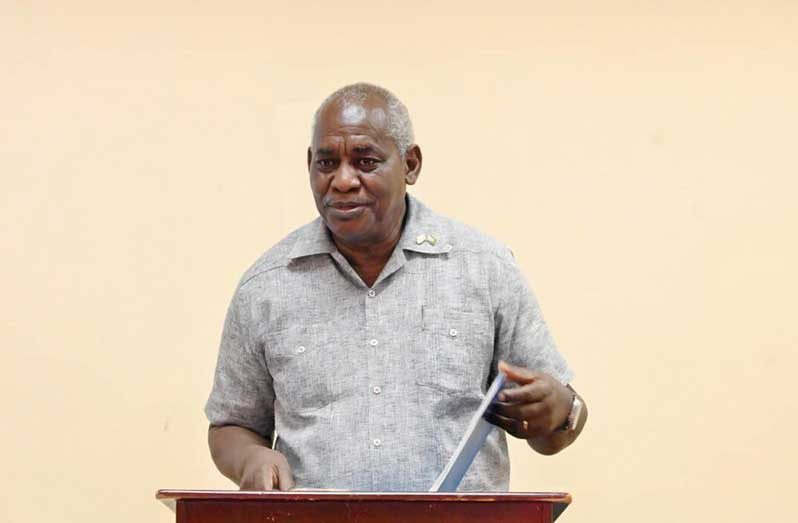IN a fervent call for safer roads, Minister of Home Affairs Robeson Benn kicked off National Road Safety Month on Monday with the powerful theme, “Do the Right Thing”.
Addressing road safety advocates, law enforcement officials, schoolchildren and members of the public at the Leonora Track and Field Facility, West Coast Demerara, he underscored the urgent need to address the alarming statistics of road fatalities caused by reckless behaviours, including speeding, driving under the influence, and distracted driving.
Minister Benn revealed that 178 people lost their lives on the nation’s roads last year, an unsettling toll largely attributed to preventable actions by drivers between the ages of 18 and 40.
This age group represents the country’s workforce, future leaders, and often parents.
The minister made an urgent appeal for citizens to join the fight against the behaviours that put so many at risk, particularly young adults who are often the most affected.
As Guyana works in accordance with the United Nations (UN) Second Decade of Action for Road Safety 2021–2030 with an aim to cut traffic deaths and injuries by 50 per cent by 2030, the minister of home affairs has called on everyone to join the efforts to battle traffic accidents.
“By 2030, the number of people dying on our roads globally should be halved. We (Guyana) did indeed have a difficult year last year. In the previous years—2022 and 2021—we were able to drop road deaths below 100 persons per year. Last year was a particularly grievous year; we lost 178 persons to road deaths, and many of those fatalities were related to motorcycle riders without helmets, speeding, and impaired driving. Driving impaired means that sometimes you are intoxicated by alcohol or some drug and, also, driving while being distracted. Some of us want to text and drive, which is also against the laws,” Minister Benn explained.
“Most of the accidents are avoidable,” Benn emphasised. With 108 road deaths recorded so far in 2024, he stated that in alignment with the United Nations (UN) Second Decade of Action for Road Safety 2021–2030, “we should only see 53 road deaths per year by 2030.”
Benn outlined some of the specific strategies implemented to move towards this goal.

“Seat belt laws were put in place. Issues relating to driving while drunk, improving the capacity and the resources of the Guyana Police force have been put in place to improve their efficiency, their presence, their awareness and their responsiveness to bad behaviour on the roads.”
He added: “A lot of what is happening is because of bad adult behaviour. Poor examples which children see, and which children replicate to themselves and amongst their friends. So, this is why we wanted to involve, particularly too, young children, schoolchildren, and young adults…”
Benn urged all citizens to view road safety as a shared responsibility.
“We have to help each other; coach each other in doing the right thing. It is okay to do the right thing; it is okay to make sure that our friends, our neighbours and the country as a whole is safer and more peaceful in relation to the effort of doing the right thing,” Benn noted.
While the 2030 target may appear daunting, the minister assured the public that it was attainable, with the right combination of education, enforcement, and cooperation from all road users.
“The Home Affairs Ministry, the Guyana Police Force, and the Guyana National Road Safety Council cannot do this by ourselves. It requires a change in culture, a change in behaviour, and greater levels of awareness among the population, among ourselves. Doing the right thing means that we must reject bad behaviour. Doing the right thing means that we would be safer in the community and that the police will not have to charge people more…”
Meanwhile, Chairman of the Guyana National Road Safety Council Earle Lambert revealed that traffic accidents claim the lives of approximately 1,190,000 people worldwide each year.
“And they leave between 20 and 50 million people with non-fatal injuries. More than half of all road traffic deaths occur among vulnerable road users, such as pedestrians, cyclists, and motorcyclists.”
Lambert highlighted that, beyond the human suffering caused by road traffic injuries, these incidents impose a significant economic burden on victims and their families.
This impact, according to him, includes the cost of medical treatment for the injured, as well as the loss of productivity for those killed or incapacitated by injuries. He added that this represents not only a tragic loss of life but also an economic setback for the country.
In Guyana, most serious accidents have been found to occur during extended weekends, from Friday to Monday, and predominantly in the evenings.
As National Road Safety Month unfolds, emphasis will be placed on ramping up public awareness campaigns focused on the dangers of speeding, drinking and driving, and using mobile phones while behind the wheel.



.jpg)








